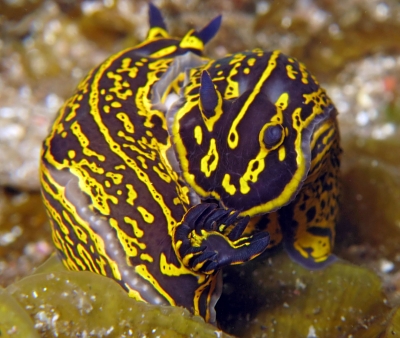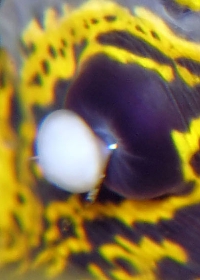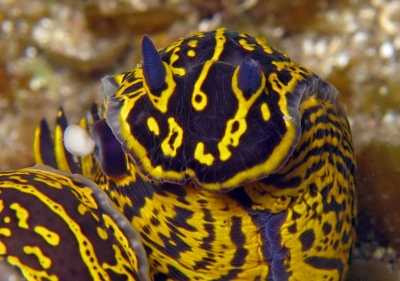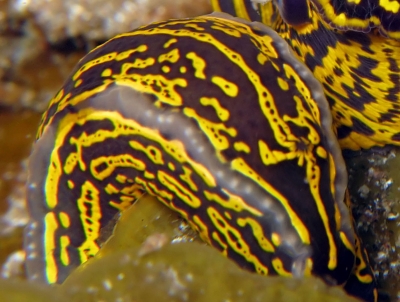Mating Hypselodoris picta from Canary Ids
August 4, 2007
From: Brian Mayes

Dear Bill,
I found two pairs of mating Hypselodoris picta webbi on a recent dive off the island of El Hierro in the Canary Islands. The pairs were only a few inches apart. It was difficult to see exactly what was going on with each pair but I managed to snap a few photos that I hope you will find interesting.
Locality: "El Rincón", La Restinga, 15 metres, El Hierro, Canary Islands, Atlantic Ocean, 26 June 2007, Rocks covered with algae and weed. Length: 70mm. Photographer: Brian Mayes.
Kind Regards
Brian Mayes
brian@mayescai.freeserve.co.uk



Dear Brian,
Thanks for these photos. It looks like the pair in the middle two photos were interrupted. The white mass you can see by the genital opening of the right animal is a packet of sperm which has clearly lost its way. It seems that during mating the animals were disturbed and while withdrawing their penes back into their bodies this blob of sperm was ejected.
In the lower photo there is a translucent greyish band along the edge of the mantle on each side, and in it you can see opaque white spheres. These are the mantle glands [or MDFs] which are characteristic of chromodorids, and are a place where they store antifeedant chemicals obtained from the sponges they eat. Each genus has a distinctive arrangement of these glands, and in Hyspelodoris there is usually a concentration of this spherical type of gland around the posterior edge of the mantle, and another concentration anteriorly alongside the rhinophores on each side. In this photo we can see the posterior concentration on the right of the photo, and the anterior concentration on the left side.
Finally, I am not sure if I agree with your use of the subspecies name Hypselodoris picta webbi. As I say on the Fact Sheet, there seem to be populations of H. p. webbi and H. p. picta on both sides of the Atlantic so there seems little reason to consider them geographical subspecies. If they are not separated geographically what is separating them? If they are living sympatrically and are genetically isolated doesn't that make them species? I am using the subspecies names for some of the other supposed subspecies of H. picta because they have distinctly different colour patterns and seem to be geographically isolated. I guess I am sitting on the fence on this question. Any other views are welcome.
Best wishes,
Bill Rudman
Related messages
-
Re: Florida nudibranch
From: Terri Johnson, June 5, 2009 -
Re: Florida nudibranch
From: Terri Johnson, June 4, 2009 -
Feeding Hypselodoris picta in an aquarium
From: Steven Soskin, August 26, 2008 -
Hypselodoris picta from Antibes, France
From: Dominique Horst, August 22, 2008 -
Hypselodoris picta from Greece
From: Hans van Rijn, February 29, 2008 -
Seaslug from Greece
From: Chris Heerema, October 9, 2007 -
Hyspelodoris picta from Lanzarote, Canary Islands
From: Mascha van Delft, August 18, 2007 -
Re: Hypselodoris picta from near Cannes, France
From: Natasja Vandeperre, August 4, 2007 -
Re: Hypselodoris picta from near Cannes, France
From: Natasja Vandeperre, July 16, 2007 -
Re: Hypselodoris picta from near Cannes, France
From: Dominique Horst, June 28, 2007 -
Re: Hypselodoris picta with abnormality
From: Dominique Horst, June 27, 2007 -
Hypselodoris picta with abnormality
From: Dominique Horst, September 2, 2006 -
Hypselodoris picta from North Carolina
From: Vlad Pambucol, August 19, 2006 -
Hypselodoris picta from the Canary Islands [2].
From: Christian Kowalewski, August 19, 2006 -
Hypselodoris picta from Canary Islands
From: Christian Kowalewski, August 19, 2006 -
Hypselodoris picta from near Cannes, France
From: Dominique Horst, June 9, 2006 -
Hypselodoris picta from Italy
From: David Shepherd, October 25, 2005 -
Juvenile Hypselodoris picta from Sorrento. Italy
From: Fabio Russo, September 16, 2005 -
Hypselodoris picta from Turkey
From: Ata Bilgili, July 4, 2005 -
Re: Hypselodoris picta from Florida
From: Karen C, March 11, 2005 -
Hypselodoris picta from Florida
From: Karen, March 9, 2005 -
Hypselodoris edenticulata pictures [2]
From: Bill Rudman, February 3, 2005 -
Hypselodoris edenticulata pictures [1]
From: Phillip Gillette, February 3, 2005 -
Hypselodoris picta from Croatia
From: Duncan v Vliet , January 22, 2004 -
Hypselodoris picta from Spain
From: Juan, November 17, 2003 -
Hypselodoris picta from Croatia
From: Adam Petrusek, October 7, 2003 -
Hypselodoris picta from Nth Carolina
From: Sandy Smith, August 26, 2003 -
Hypselodoris picta from Israel
From: Ilan Ben Tov, July 25, 2003 -
Hypselodoris picta
From: Chris, May 20, 2003 -
Hypselodoris picta feeding
From: Linda Ianniello, March 22, 2003 -
Hypselodoris picta from Croatia
From: Frank Thijssen, December 20, 2002 -
Thanks
From: Joel Penland, December 11, 2002 -
Hypselodoris picta from South Carolina
From: Joel Penland, December 5, 2002 -
Hypselodoris picta? from Spain
From: Isidro Cuallado, October 22, 2002 -
Hypselodoris picta from the Mediterranean (1)
From: Marina Poddubetskaia, August 6, 2002 -
Hypselodoris picta from the Mediterranean (2)
From: Marina Poddubetskaia, August 6, 2002 -
Hypselodoris picta from Greece
From: Fons Sarneel, March 19, 2002 -
Information on Hypselodoris picta
From: Joe Helferich, January 31, 2002 -
Mystery photo of 'Greek Goddess'
From: Anonymous, December 11, 2001 -
Hypselodoris picta and sponge
From: Luis Sánchez Tocino , November 7, 2001 -
Hypselodoris picta from Spain
From: Luis Sánchez Tocino , November 5, 2001 -
Sea Goddess Nudibranch
From: Frank Winston , August 25, 2001 -
Re: Hypselodoris edenticulata from Florida
From: Maria, July 18, 2001 -
Hypselodoris edenticulata from Florida
From: Anne DuPont, July 14, 2001 -
Hypselodoris picta from the Adriatic Sea
From: Buga Berkovic , July 1, 2001 -
Possible food source for Hypselodoris edenticulata
From: Mike Bloss, June 8, 2001 -
Re: Possible food of Hypselodoris edenticulata
From: Juan Lucas Cervera, June 8, 2001 -
Can you identify a species & it's diet
From: Brad Anderson, April 13, 2001 -
Re: Food of Hypselodoris picta
From: Mark Bass, April 4, 2001 -
Re: Hypselodoris picta
From: Mark Bass, April 3, 2001 -
Food of Hypselodoris picta
From: Shawna, April 3, 2001 -
Hypselodoris picta
From: Mark Bass, March 23, 2001 -
Nudibranch - Blue with Yellow Spots
From: Mark Bass, March 22, 2001 -
'Greek Goddess' Sea Slug
From: Robin, February 8, 2001 -
Blue chromodorid from the Mediterranean
From: Erwin Koehler, January 26, 2001 -
Re: Blue chromodorid from Antibes
From: Angel Valdes, January 26, 2001 -
Greek goddess sea slug
From: Holly, July 19, 2000 -
Hypselodoris picta & Florida slug
From: Erwin Koehler, June 1, 2000 -
Florida nudibranch
From: Robert Schroff, May 26, 2000
